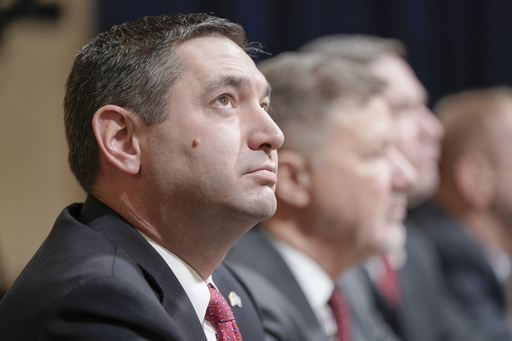HELENA, Mont. — Austin Knudsen, the Republican attorney general of Montana, has faced various controversies during his almost four-year term, which have drawn considerable attention and concern.
His office has controversially aligned itself with an individual who made armed threats against a mask mandate related to the pandemic, and it was accused of pressuring a medical facility in Helena for not administering a parasite medication to a COVID-19 patient. In addition to these incidents, Knudsen sought to hinder three constitutional initiatives from being placed on the November ballot, attempted to present a rival candidate for the June primary merely to enhance his fundraising efforts, and was involved in a lawsuit after overseeing the resignation of the head of the Montana Highway Patrol.
On Wednesday, Knudsen attended a hearing that could adjudicate additional claims regarding professional misconduct linked to his staunch defense of a law permitting Montana’s governor to fill judicial vacancies directly. This legislative action is part of a broader Republican initiative aimed at cultivating a more conservative judiciary across the nation.
A judicial disciplinary body reported in 2023 that Knudsen’s office allegedly attempted to bypass the authority of the state Supreme Court by dismissing the legitimacy of its orders. The proceedings regarding 41 allegations of professional misconduct against Knudsen may extend up to three days, according to officials. The timeline remains uncertain for when the panel will issue recommendations regarding potential violations of practice rules and possible disciplinary action.
Defending his conduct, Knudsen contends that he and his team acted “zealously” in representing the Legislature within a separation-of-powers framework, arguing that the scope of legislative subpoena powers and the courts’ ability to nullify them had not previously been examined in court. Christian Corrigan, Knudsen’s attorney, described the situation as significant constitutional litigation representing a clash among branches of government.
During his testimony, Knudsen acknowledged that a degree of overzealousness may have been present. “If I’m being really honest, in hindsight, I think a lot of things could have been done differently and probably should have been done different here,” he admitted. He reflected that had he the opportunity to redo these circumstances, he might have advised against using particularly sharp language that was employed during this period, expressing that they believed they faced a genuinely unprecedented constitutional crisis.
Republicans have frequently accused Montana judges of overstepping by essentially creating laws when declaring statutes related to abortion or gun regulation unconstitutional. This situation has raised questions regarding whether justices should intercept a case concerning their authority to invalidate a legislative subpoena implicating their court administrator.
The complaints against Knudsen and his staff stem from events in 2021 while state lawmakers labored to pass a measure aimed at terminating a commission responsible for recommending potential judges. Lawmakers discovered that a Supreme Court administrator had utilized state software for surveying judges regarding this legislation at the behest of the Montana Judges Association. Following the deletion of relevant emails by the court administrator, the Legislature issued a subpoena to the Department of Administration. The department responded by providing 5,000 emails from the administrator by the next day.
Eventually, the Montana Supreme Court quashed the subpoena, although some emails had already been disclosed to the press before the court acted. The then-Chief Deputy Attorney General Kristin Hansen, now deceased, answered the Supreme Court by stating that the “legislature does not recognize this Court’s order as binding” and asserted lawmakers would not permit the judiciary to obstruct their inquiry into “serious and troubling conduct” by judiciary members.
Knudsen testified that Hansen, a former legislator, was animated and sought to express strong language to champion the legislature’s stance. The Legislature also requested that the justices recuse themselves from the case based on perceived conflicts of interest, due to the involvement of the court administrator. However, the justices denied that motion, suggesting the Legislature had created a conflict by issuing subpoenas to each justice for their emails.
In a letter directed to the court in May 2021, Knudsen criticized the justices’ comments as mere “thinly veiled threats” that questioned the professional integrity of the attorneys in his office. He stated that “lawyers also have affirmative obligations to report judicial misconduct.”
Timothy Strauch, a special counsel with the Office of Disciplinary Counsel, pressed Knudsen on whether the phrases used in motions and letters from his office could be characterized as disrespectful or undignified, which violates established practice rules. Knudsen consistently responded with a “no.”
Towards the end of 2021, Knudsen’s office petitioned the U.S. Supreme Court to take on the subpoena case, alleging judicial self-dealing on a possibly unprecedented scale. However, the Supreme Court declined review. Ultimately, the Montana Supreme Court upheld the legislation permitting the governor to appoint judges, confirming Knudsen’s position in this contentious political climate.
